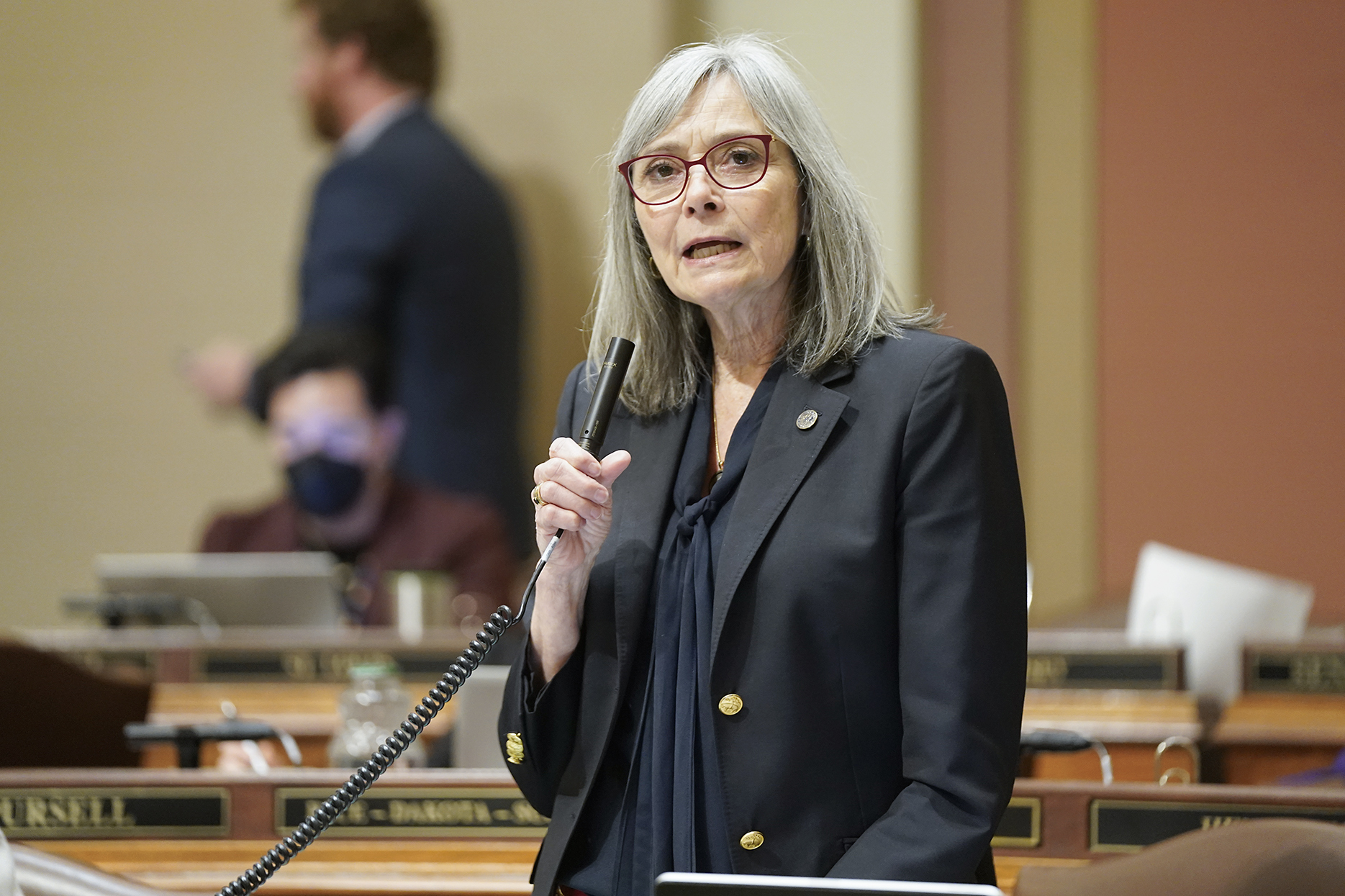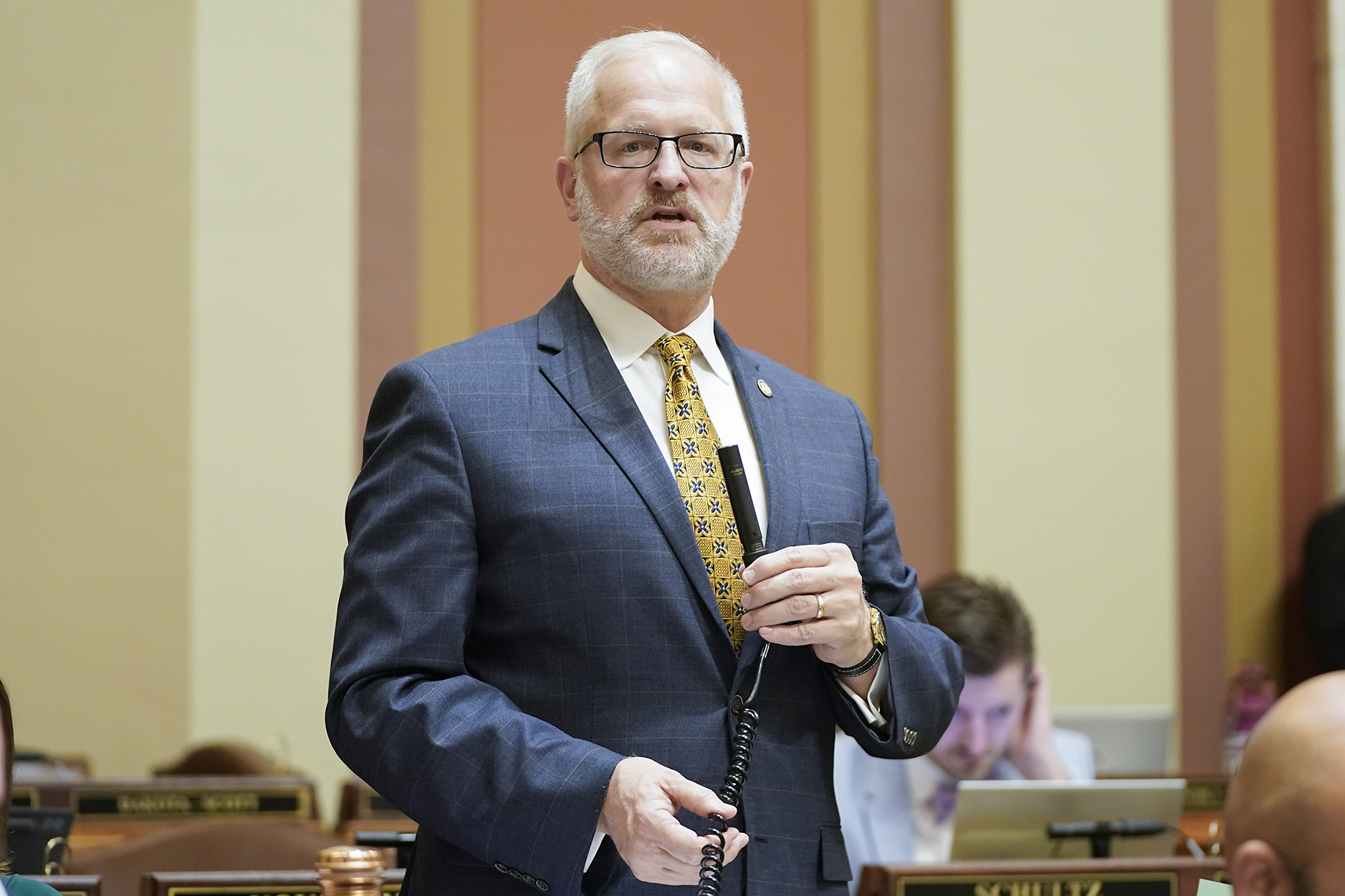Compromise bill funding state government, elections passes off House Floor

Votes were plentiful Thursday for the omnibus state government finance and elections bill.
Passed 113-21 by the House Thursday, HF2783/SF3045*, as amended largely to include House language, next returns to the Senate, which passed its version 35-29 April 25. A conference committee will probably be needed to reach an agreement.
“It funds the Capitol, which is the beacon of democracy in our state. Further, it supports 30 boards and commissions. It supports major parts of the government that most people don’t see touch their lives every day,” said Rep. Ginny Klevorn (DFL-Plymouth), the bill sponsor who co-chairs the House State Government Finance and Policy Committee with Rep. Jim Nash (R-Waconia).
“This bill does two important things,” she added. “It slows the growth of government, which is important to (the Republican) side of the aisle, and it holds core services, which is important to our side of the aisle.”
Added Nash: “It’s a bill written by two people from two sides of the aisle in as good a fashion as we could possibly do. There are things in here for Republicans, there are things in here for Democrats.”
The state government portion of the bill contains $1.35 billion in spending for the 2026-27 biennium, a $45 million increase over February’s forecast base.
 Rep. Jim Nash, co-chair of the House State Government Finance and Policy Committee, discusses SF3045, the omnibus state government finance and elections bill, on the House Floor May 1. (Photo by Michele Jokinen)
Rep. Jim Nash, co-chair of the House State Government Finance and Policy Committee, discusses SF3045, the omnibus state government finance and elections bill, on the House Floor May 1. (Photo by Michele Jokinen) Most state agencies and departments are slated to get a small operating increase, often to maintain current levels of service. Although Minnesota Management and Budget would get $2.35 million for a new Healthy Aging Subcabinet and the Office of the Attorney General would receive $782,000 to expand Medicaid Fraud Division staffing by nine persons (federal funds are expected to cover 75% of the positions).
Operating adjustment reductions of $1.2 million for Minnesota IT and $1.02 million for the Department of Administration are in the bill.
The House, Senate and Legislative Coordinating Commission are slated to receive a combined $24.36 million increase, mostly in operating adjustments. Amongst new spending in that total is $579,000 for a special review unit within the Office of the Legislative Auditor. The same amount would be for an annual report showing if identified recommendations by the office during the prior five years in a financial audit, program evaluation, or special review have been implemented.
[MORE: Download summary and detailed fiscal tracking sheet, change items]
In addition to a special review unit within the Office of the Legislative Auditor, the bill would attack fraud through additional staffing and subpoena power for the attorney general’s office to combat Medicaid fraud, and establishment of a process to challenge and remove fraudulent business filings filed with the Office of the Secretary of State.
[MORE: $45 million increase proposed in state government spending bill]
Other proposed policy changes include: extending by 18 months the availability of $5 million to implement the updated Capitol Mall Design Framework; modifying standards for required education and experience for certified public accountants, and establishing mobility for licensed public accountants; and extending by one year the due date and funding for a geophysical study and hazard assessment of the St. Anthony Falls area and cutoff wall in Minneapolis.
An amendment successfully offered by Rep. Tom Sexton (R-Waseca) would allow a House or Senate member deployed on military orders to designate another member as a proxy who may cast the vote of the deployed member.
ELECTIONS
“This bill ensures that here in Minnesota that our elections are safe, secure and free,” said Rep. Mike Freiberg (DFL-Golden Valley), co-chair of the House Elections Finance and Government Operations Committee.
Based off the Freiberg-sponsored HF1378 and HF1943, the overall elections finance provisions would allocate $3.86 million in spending for the 2026-27 biennium, with a majority of the funding — $1.81 million in fiscal year 2026 and $1.84 million in fiscal year 2027 — going to the Campaign Finance and Public Disclosure Board, whose duties include administering registration and reporting for candidates, political party units, political committees and independent expenditure committees and funds.
A one-time $200,000 appropriation in fiscal year 2026 would go to the Secretary of State’s Office for the Help America Vote Act account. Minnesota received $1 million in federal funds in 2024, and this funding is the required 20% state match.
“These dollars are primarily used for election security measures like cybersecurity software, improvements to the statewide voter registration system and the security navigator team,” Freiberg said.
[MORE: Download the spreadsheet]
Among other policy provisions, there would be wholesale changes in the way Minnesotans apply for absentee ballots, vote early and in the way those votes are handled and counted; counties would be required to develop a chain of custody plan for handling election-related materials, including absentee ballots, that would need to account for both the physical and cybersecurity of materials; and the bill would prohibit an organization that receives state funding from making political contributions or expending money for political purposes. The entity could make donations only if that entity uses separate accounts for political activities and for activities funded by the state.
[MORE: Omnibus elections policy bill clears committee, heads to House Floor]
Rep. Emma Greenman (DFL-Mpls) unsuccessfully offered an amendment that would have made it a misdemeanor to provide a chance to win any money, food, liquor, clothing, entertainment, or other item or service of monetary value more than $20, to persuade an individual to register to vote or sign a voting petition.
— Session Daily writer Brian Basham contributed to this story
Related Articles
Search Session Daily
Advanced Search OptionsPriority Dailies
Stable budget outlook projects $3.7 billion surplus now, no deficit in next biennium
By Lisa Kaczke The projected surplus for Fiscal Years 2026-27 is now higher than it was in the November estimate, and no deficit is projected for the next biennium.
“Minnesota’s budge...
The projected surplus for Fiscal Years 2026-27 is now higher than it was in the November estimate, and no deficit is projected for the next biennium.
“Minnesota’s budge...
Legislative leaders set 2026 committee deadlines
By Lisa Kaczke Legislative leaders on Tuesday officially set the timeline for getting bills through the committee process during the upcoming 2026 session.
Here are the three deadlines for...
Legislative leaders on Tuesday officially set the timeline for getting bills through the committee process during the upcoming 2026 session.
Here are the three deadlines for...